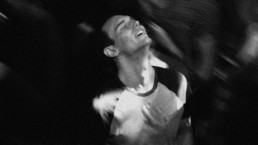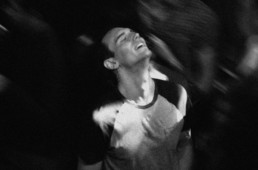‘1985’ Review: Coming Out and Coming Clean
This is a custom heading element.
“Carly, the reason I didn’t call you… I went there to start over. I really needed a fresh start. I didn’t like my life here…and that’s that.”
That’s how Adrian (Cory Michael Smith), the main character of Yen Tan’s 1985, explains years of radio silence to his childhood best friend, Carly, a Korean-American comic played with wounded charm by Jamie Chung. Adrian and Carly endured middle and high school together with humor, yet after his move to New York, Adrian ignored her calls. Nevertheless, when he visits home he’s so eager to see her that he drives out at the last minute to her performance. When they meet she can sense something off in his halting answers, the way he avoids the details of his life. Angry at his mixed messages, she ends their night out in a fight.
1985 is a film of such unfinished conversations as Adrian, a closeted young man in the midst of the AIDS crisis, ducks and dodges through a tense Christmas visit home. He lost the man he loved and expects he won’t survive another year. He plans for all of this baggage to go unsaid to his conservative family. Adrian’s aim, which he pursues with wrenching commitment, is gifting his family an idealized goodbye. Yet, if these people love Adrian, we can hope they’ll perceive his pain. The film mines tension from whether, and how, the truth can break free.
Cory Michael Smith (Gotham) shines in the role, capturing the strain of forced cheer as well as the care Adrian holds for those he’s compelled to lie to. He’s seen familial rejection happen to friends in the LGBTQ community and has done his own calculus. He chooses to mask himself in exchange for a peaceful goodbye with family, fearing the truth would crush their support for him.
1985 follows Adrian through this impossibly cruel circumstance, which so many face without society’s support, and often with its open hatred. Smith’s performance is rich and real when it shows flashes of the confident, joyful Adrian that existed in New York until he lost his partner, and his job, to AIDS. Yet despite strong performances and compelling tensions, the film does struggle with monotony and lack of development.
On the whole, I salute the director, Yen Tan, and his crew for their sweet and mournful approach to a terrible epidemic and I admire their ambition in shooting this on 16mm film.
There is repetition where there should be momentum. The film is mainly a succession of stressful conversations that unfold like a play, with the camera at a distance and the characters sitting awkwardly in restaurant booths and patio furniture. These distant scenes made me long for more from Adrian’s friends and brother, with whom he is more open as a mentor and confidante. Another version of this story might have given one or two relationships more heft rather than spreading itself thin. As it is, the equal time that is given to Adrian’s brother, father, best friend, and mother make each relationship dynamic feel shortchanged, and their outcome harder to invest in.
That said, some scenes are lovely. My favorite is Adrian’s late night talk with his mother (Oscar-nominee Virginia Madsen). In the warmest scene of the film, she covertly tells Adrian she didn’t vote for Ronald Reagan and didn’t tell his father. She speaks with pride about her hopes for an Equal Rights Amendment, inviting her son to talk to her earnestly about the state of the world. Adrian’s surprised delight at this unseen side of a parent, who never seemed political before, is very cute.
If only all of the film had that spark and specificity. Other scenes fall into cliché, especially those involving the father’s heavy-handed remarks about his younger son becoming soft, bemoaning how “everything was fine when he played football.” As Adrian’s father, Dale, Michael Chiklis does his best but the character remains so dull.
On the whole, I salute the director, Yen Tan, and his crew for their sweet and mournful approach to a terrible epidemic and I admire their ambition in shooting this on 16mm film. Structural problems and a slow pace do leave certain character dynamics under-served, but for a film about a character who knows much in his life may go unsaid and unfinished, that’s a fitting narrative flaw to have.
‘1985’ is not rated. 85 minutes. Opening this Friday at Laemmle’s Glendale Theatre.
Kailee Andrews
Kailee holds a Communication Arts B.A. from the University of Wisconsin. At 21, she programmed her first film festival for an audience of 4,000+ on campus. Since then, it's been all about sharing the cool arts and crafts of cinema.


